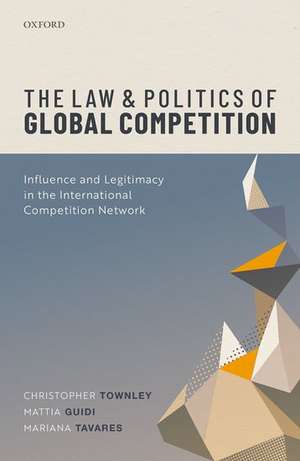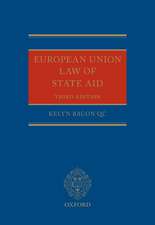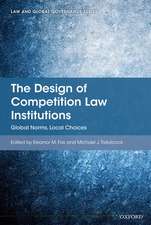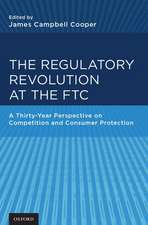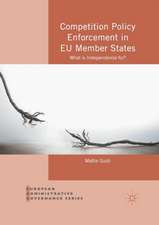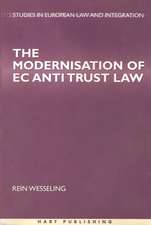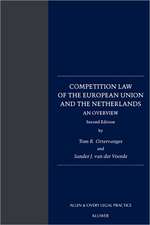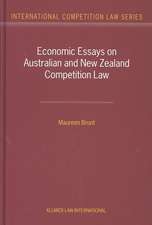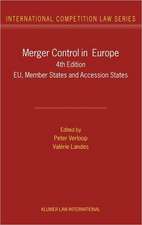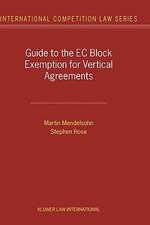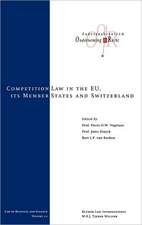The Law and Politics of Global Competition: Influence and Legitimacy in the International Competition Network
Autor Christopher Townley, Mattia Guidi, Mariana Tavaresen Limba Engleză Hardback – 31 ian 2022
Preț: 660.20 lei
Preț vechi: 945.29 lei
-30% Nou
Puncte Express: 990
Preț estimativ în valută:
126.33€ • 132.23$ • 105.15£
126.33€ • 132.23$ • 105.15£
Carte disponibilă
Livrare economică 27 februarie-05 martie
Preluare comenzi: 021 569.72.76
Specificații
ISBN-13: 9780198859789
ISBN-10: 0198859783
Pagini: 400
Dimensiuni: 160 x 241 x 25 mm
Greutate: 0.71 kg
Ediția:1
Editura: OUP OXFORD
Colecția OUP Oxford
Locul publicării:Oxford, United Kingdom
ISBN-10: 0198859783
Pagini: 400
Dimensiuni: 160 x 241 x 25 mm
Greutate: 0.71 kg
Ediția:1
Editura: OUP OXFORD
Colecția OUP Oxford
Locul publicării:Oxford, United Kingdom
Recenzii
Clearly, this book is a must-read for legislators, regulators and researchers. It offers a remarkable critical perspective on an international forum that, until now, has received nothing but praise and has been promoted as a model to follow. Both in terms of the angles of approach and the method of analysis, one can only welcome the authors' approach and be convinced of the need to be more lucid about certain shortcomings of the International Competition Network (ICN).This is a translated excerpt. The full original review can be found here: https://www.concurrences.com/en/review/issues/no-2-2022/livr
Townley, Guidi and Tavares provide a thought-provoking description, analysis and critique of a significant contemporaneous development in international competition law regulation and enforcement in a globalised economic market context. This book offers a comprehensive historical account and devastating analysis of the key failings of the ICN, in terms of its effectiveness, efficiency and legitimacy. The work is theoretically rich, densely footnoted and references a vast array of academic literature across law and the social sciences, whilst also grounded in empirical work based on a survey of participants. This book is an essential read for academics, policy-makers, and practitioners interested in the workings of epistemological communities, international policy-making and globalisation of international norms and practice.
Theoretically innovative and empirically rich, this is an indispensable read for all who are interested in the International Competition Network and international co-ordination of markets. In exploring international regulation, the authors skilfully untangle the legal, socio-economic and political factors that impact the transparency, legitimacy, effectiveness and efficiency of the ICN as it attempts to regulate global competition. This book is very timely in making sense of the above, as governments and national competition authorities grapple with governing global supply chains, and actively reassess the function and role of the International Competition Network. As such, this book provides an important conceptual framework for thinking about these new networks, whilst also providing potential recommendations for policymakers and legal and political scholars of international competition.
This book is a monumental and provocative reexamination of the workings of the International Competition Network from a political economy and power/interest perspective. It digs deeply into the questions: who are its influencers, what are its influences, and what is its legitimacy and effectiveness? Its probing questions, descriptions, insights and suggestions should be a great resource for the ICN's Third Decade bottom-to-top review of the ICN.
Law and Politics of Global Competition: Influence and Legitimacy in the International Competition Network provides a comprehensive and forthright assessment of the network's processes, goals and accomplishments during its 20 years of existence and outlines essential agenda items for its Third Decade Project. Its novel focus on legitimacy, effectiveness, efficiency, and transparency of the ICN sheds light on key issues that merit careful consideration. This very well written and thought-provoking book is a fundamental tool for what the authors describe as "the battle for the ICN's soul" and a must-read for NCAs, NGAs, states and all partners of the network.
Law and Politics of Global Competition provides a compelling analysis of how the International Competition Network (ICN) operates in the real world. The ICN is an important force in the formulation and implementation of international competition law and policy. This book provides a powerful analysis of how the ICN achieves its aims of achieving substantive and procedural convergence and when it falls short. The authors effectively use law, political theory, survey data, and common sense to highlight who are the rule makers and who are the rule takers in an organization that holds itself out as consensus based and without binding effects for its work product.
In this book, Townley, Guidi, and Tavares shed light on an important yet often-overlooked aspect of global competition law: the political dynamics behind the actions taken by the International Competition Network. Their thought-provoking analysis clears the way for a fresh discussion of the actual role that the ICN plays in the global competition law arena, and the way to strengthen its legitimacy, efficiency, and effectiveness. It is a must-read for anyone interested in global competition law. It may also serve as a case study for anyone interested in the politics of voluntary international cooperation in informal trans-national networks.
As it enters its third decade, the International Competition Network is still a black box for those on the outside. Townley, Guidi and Tavares open this box and present us with an insightful analysis of what goes on inside this transnational network of competition agencies. Through an interdisciplinary perspective and incorporating an original survey of the ICN members, the authors demonstrate that despite the soft law nature of its recommendations and consensus requirements, a group of advanced industrial economies have been able to exercise a powerful influence in the organization, promoting competition rules that benefit their jurisdictions, and their multinational corporations and law firms. A must-read for anyone interested in the international dimensions of competition policy, and questions of power and legitimacy within transnational regulatory networks.
The reviewed book warrants a very high rating and is deemed essential reading for anyone involved in international antitrust and multilevel governance.
Townley, Guidi and Tavares provide a thought-provoking description, analysis and critique of a significant contemporaneous development in international competition law regulation and enforcement in a globalised economic market context. This book offers a comprehensive historical account and devastating analysis of the key failings of the ICN, in terms of its effectiveness, efficiency and legitimacy. The work is theoretically rich, densely footnoted and references a vast array of academic literature across law and the social sciences, whilst also grounded in empirical work based on a survey of participants. This book is an essential read for academics, policy-makers, and practitioners interested in the workings of epistemological communities, international policy-making and globalisation of international norms and practice.
Theoretically innovative and empirically rich, this is an indispensable read for all who are interested in the International Competition Network and international co-ordination of markets. In exploring international regulation, the authors skilfully untangle the legal, socio-economic and political factors that impact the transparency, legitimacy, effectiveness and efficiency of the ICN as it attempts to regulate global competition. This book is very timely in making sense of the above, as governments and national competition authorities grapple with governing global supply chains, and actively reassess the function and role of the International Competition Network. As such, this book provides an important conceptual framework for thinking about these new networks, whilst also providing potential recommendations for policymakers and legal and political scholars of international competition.
This book is a monumental and provocative reexamination of the workings of the International Competition Network from a political economy and power/interest perspective. It digs deeply into the questions: who are its influencers, what are its influences, and what is its legitimacy and effectiveness? Its probing questions, descriptions, insights and suggestions should be a great resource for the ICN's Third Decade bottom-to-top review of the ICN.
Law and Politics of Global Competition: Influence and Legitimacy in the International Competition Network provides a comprehensive and forthright assessment of the network's processes, goals and accomplishments during its 20 years of existence and outlines essential agenda items for its Third Decade Project. Its novel focus on legitimacy, effectiveness, efficiency, and transparency of the ICN sheds light on key issues that merit careful consideration. This very well written and thought-provoking book is a fundamental tool for what the authors describe as "the battle for the ICN's soul" and a must-read for NCAs, NGAs, states and all partners of the network.
Law and Politics of Global Competition provides a compelling analysis of how the International Competition Network (ICN) operates in the real world. The ICN is an important force in the formulation and implementation of international competition law and policy. This book provides a powerful analysis of how the ICN achieves its aims of achieving substantive and procedural convergence and when it falls short. The authors effectively use law, political theory, survey data, and common sense to highlight who are the rule makers and who are the rule takers in an organization that holds itself out as consensus based and without binding effects for its work product.
In this book, Townley, Guidi, and Tavares shed light on an important yet often-overlooked aspect of global competition law: the political dynamics behind the actions taken by the International Competition Network. Their thought-provoking analysis clears the way for a fresh discussion of the actual role that the ICN plays in the global competition law arena, and the way to strengthen its legitimacy, efficiency, and effectiveness. It is a must-read for anyone interested in global competition law. It may also serve as a case study for anyone interested in the politics of voluntary international cooperation in informal trans-national networks.
As it enters its third decade, the International Competition Network is still a black box for those on the outside. Townley, Guidi and Tavares open this box and present us with an insightful analysis of what goes on inside this transnational network of competition agencies. Through an interdisciplinary perspective and incorporating an original survey of the ICN members, the authors demonstrate that despite the soft law nature of its recommendations and consensus requirements, a group of advanced industrial economies have been able to exercise a powerful influence in the organization, promoting competition rules that benefit their jurisdictions, and their multinational corporations and law firms. A must-read for anyone interested in the international dimensions of competition policy, and questions of power and legitimacy within transnational regulatory networks.
The reviewed book warrants a very high rating and is deemed essential reading for anyone involved in international antitrust and multilevel governance.
Notă biografică
Christopher Townley has been an academic in the Law School at King's College London since 2007. Before that he was a Principal Case Officer in the Office of Fair Trading (a UK competition authority) and a solicitor at Clifford Chance LLP (a law firm). Since joining King's, Christopher has provided teaching and/ or advice to several bodies, including the Superintendence of Industry and Commerce (Columbia), the Egyptian Competition Authority, The National Broadcasting and Telecommunications Commission (Thailand), The NHS (UK), the Office of Fair Trading (UK), Ofcom (UK), The Pakistan Competition Commission, UNCTAD, and the World Bank.Mattia Guidi is Assistant Professor of Political Science at the Department of Social, Political and Cognitive Sciences of the University of Siena. His research interests include the economic governance of the European Union, international and comparative political economy, and public opinion (in particular in relation to populist attitudes). He has published in international journals like International Organization, Socio-Economic Review, Regulation & Governance, Governance, European Union Politics. His monograph "Competition policy enforcement in EU member states" (2016) is published by Palgrave MacMillan in the European Administrative Governance series.Mariana Tavares is Counsel at Cruz Vilaça Advogados. She served as a law clerk (référendaire) at the Court of Justice of the European Union and was a United Nations International Consultant for competition matters. She held several senior positions at the Portuguese Competition Authority and has been closely involved with the development of European and international competition law and policy. Mariana Tavares served as chair of several Working Groups of the European Competition Network and the International Competition Network and she also participated actively in the work of the BRICS Competition Law and Policy Centre, OECD and UNCTAD. She holds a Ph.D. from King's College London.
